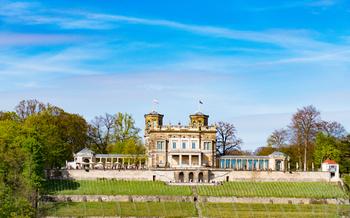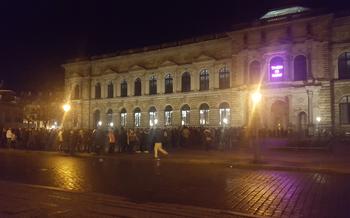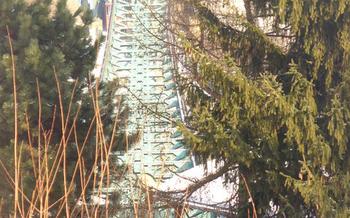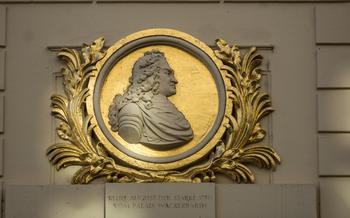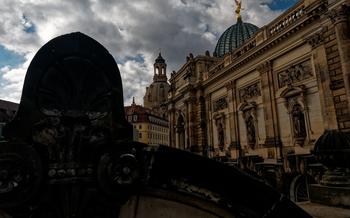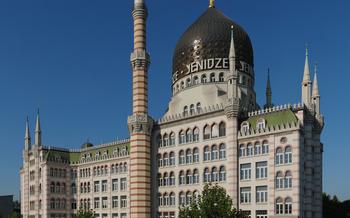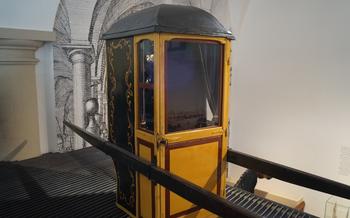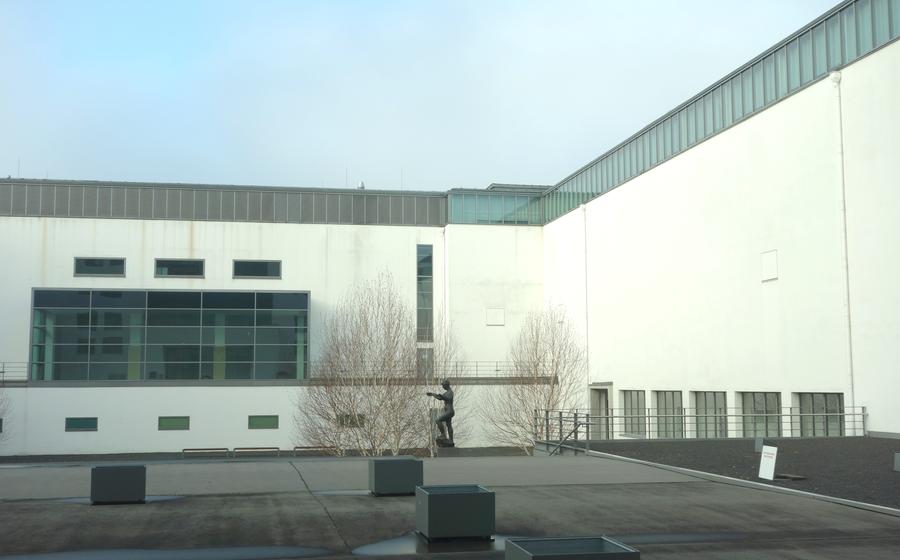
German Hygiene Museum
- The German Hygiene Museum: A Journey Through Health and Well-being
- A Glimpse into the Human Body
- The Science of Hygiene: Past and Present
- Health and Lifestyle Choices
- Exploring the World of Medicine
- The Art of Healing: Where Medicine Meets Creativity
- Controversial Topics in Medicine
- A Place for Reflection and Inspiration
- Educational Programs for All Ages
- Collaborative Research and Partnerships
- Temporary Exhibitions and Special Events
- Getting to the German Hygiene Museum
- Insider Tip: A Hidden Treasure
The German Hygiene Museum: A Journey Through Health and Well-being
In the vibrant city of Dresden, Germany, lies a unique institution dedicated to the exploration of health, hygiene, and the human body. The German Hygiene Museum, established in 1912, has become a renowned center for public health education and a captivating destination for visitors seeking to delve into the world of human well-being. With its thought-provoking exhibitions, interactive displays, and educational programs, the museum offers an immersive journey through the fascinating realms of health and hygiene.
Step into the German Hygiene Museum, and embark on a voyage of discovery that will challenge your perceptions of health and well-being. Explore the intricate workings of the human body, unravel the history of hygiene practices, and gain insights into the latest medical advancements. Whether you're a curious traveler, a health enthusiast, or simply seeking a unique and educational experience, the German Hygiene Museum promises an unforgettable adventure into the world of health and hygiene.
A Glimpse into the Human Body
The German Hygiene Museum offers a fascinating journey into the inner workings of the human body. Through detailed models, interactive displays, and guided tours, visitors can explore the intricate systems and organs that make us function. From the intricate network of the circulatory system to the complex processes of digestion and respiration, the museum provides a comprehensive understanding of human anatomy and physiology.
Interactive exhibits allow visitors to engage with the body's functions in a hands-on manner. They can measure their heart rate, test their reaction times, and even simulate the process of breathing. These interactive experiences not only enhance understanding but also make learning about the human body an enjoyable and memorable activity.
The museum's knowledgeable guides lead in-depth tours, providing insights into the latest medical research and discoveries. They explain the intricate relationships between different organs and systems, highlighting the incredible complexity and resilience of the human body. Whether you are a medical student, a curious learner, or simply fascinated by the human form, the German Hygiene Museum offers a unique opportunity to explore the wonders of the human body.
The Science of Hygiene: Past and Present
The German Hygiene Museum delves into the fascinating history of hygiene practices and public health. Through interactive exhibits, visitors can trace the evolution of hygiene from ancient civilizations to modern times. Discover how advancements in sanitation, vaccination, and disease prevention have shaped human health and well-being. Explore historical medical instruments, learn about the pioneers of hygiene, and witness the impact of hygiene on global health.
The museum also showcases the latest hygiene techniques and technologies. Interactive displays demonstrate proper handwashing techniques, the importance of clean water and sanitation, and the role of hygiene in preventing the spread of infectious diseases. Visitors can engage in hands-on activities to test their hygiene knowledge and learn about best practices for personal and public health.
Through workshops and lectures, the museum provides a platform for experts to share their insights on hygiene-related topics. These sessions cover a wide range of issues, from the history of pandemics to the latest developments in hygiene research. Whether you're a student, a healthcare professional, or simply someone interested in learning more about hygiene, the German Hygiene Museum offers a wealth of knowledge and inspiration.
Health and Lifestyle Choices
The German Hygiene Museum delves into the crucial connection between lifestyle choices and overall health and well-being. Through interactive displays, visitors can explore how nutrition, exercise, and stress management impact their physical and mental health. The museum emphasizes the significance of making informed decisions about lifestyle choices and provides practical tips and advice for adopting healthier habits.
One of the highlights of this section is the "Food Choices" exhibit, which showcases the importance of a balanced diet. Visitors can learn about the benefits of different food groups and how to make healthier choices when it comes to meals and snacks. Interactive displays allow visitors to experiment with different food combinations and see how they affect their virtual bodies.
Another popular exhibit focuses on the role of exercise in maintaining a healthy lifestyle. Visitors can explore various physical activities, from gentle yoga to high-intensity workouts, and learn about the benefits of regular exercise for both the body and mind. Interactive displays allow visitors to measure their heart rate, try out different exercises, and track their progress over time.
The museum also addresses the impact of stress on health and well-being. Visitors can learn about the different types of stress, how it affects the body, and strategies for managing stress effectively. Interactive displays allow visitors to measure their stress levels, practice relaxation techniques, and learn about the importance of self-care.
By providing interactive experiences and practical advice, the German Hygiene Museum empowers visitors to make informed choices about their lifestyles and improve their overall health and well-being.
Exploring the World of Medicine
The German Hygiene Museum also offers an in-depth exploration of the world of medicine. Exhibits showcase the history of medical practices, from ancient remedies to modern-day technologies. Interactive displays allow visitors to virtually experience different medical specialties, such as surgery, cardiology, and neurology. Guided tours and workshops provide an opportunity to learn about specific medical topics, such as the human immune system or the latest cancer treatments.
Whether you're interested in learning about the history of medicine, exploring different medical specialties, or simply understanding your own body better, the German Hygiene Museum has something to offer. With its interactive exhibits, educational programs, and collaborative partnerships, the museum promotes a deeper understanding of health, hygiene, and the human body.
The Art of Healing: Where Medicine Meets Creativity
The German Hygiene Museum offers a unique perspective on the intersection of art and medicine. Through captivating exhibitions, visitors can explore the ways in which art has been used to portray, understand, and promote health and well-being throughout history.
One of the highlights of this section is the collection of medical illustrations, which provide a glimpse into the development of medical knowledge and the changing perceptions of the human body. From intricate anatomical drawings to vivid depictions of diseases, these illustrations offer a fascinating window into the history of medicine.
Another highlight is the display of medical sculptures and paintings, which showcase the power of art to convey the emotional and psychological aspects of illness and healing. From sculptures that capture the suffering and resilience of patients to paintings that depict the dedication and compassion of healthcare professionals, these works of art offer a deeply moving and human perspective on the medical experience.
In addition to these permanent exhibitions, the museum also hosts workshops and classes on art therapy and the healing power of creativity. These programs provide participants with the opportunity to explore their own creativity and its potential to promote their well-being.
Controversial Topics in Medicine
The German Hygiene Museum also tackles controversial topics in medicine, encouraging critical thinking and informed discussions. Thought-provoking exhibits explore ethical dilemmas and societal debates surrounding issues such as euthanasia, genetic engineering, and alternative medicine. Interactive displays invite visitors to engage with these topics, consider different perspectives, and form their own opinions. Workshops, debates, and lectures provide platforms for experts and the public to discuss these complex issues openly and constructively. The museum's commitment to presenting diverse viewpoints fosters a deeper understanding of the challenges and opportunities in modern medicine and healthcare.
A Place for Reflection and Inspiration
The German Hygiene Museum provides visitors with a place for contemplation and self-reflection on their own health and well-being. Through interactive exhibits, visitors are encouraged to consider their lifestyle choices, habits, and attitudes towards their health. Thought-provoking displays prompt visitors to reflect on the interconnectedness of mind, body, and spirit, inviting them to explore the role of emotions, stress, and mental well-being in their overall health.
Quiet spaces within the museum offer visitors a sanctuary to pause, reflect, and connect with their inner selves. These spaces may feature comfortable seating areas, calming visuals, and soothing sounds, providing an opportunity for visitors to take a break from the stimulation of the exhibits and simply be present in the moment. Guided meditations, mindfulness workshops, and stress-reduction seminars are also offered at the museum, allowing visitors to delve deeper into practices that promote inner peace and well-being.
By creating spaces and experiences that encourage self-reflection and introspection, the German Hygiene Museum empowers visitors to take an active role in their own health and well-being, fostering a deeper understanding of the mind-body connection and inspiring positive lifestyle choices.
Educational Programs for All Ages
The German Hygiene Museum recognizes the importance of instilling health consciousness and knowledge from a young age. To that end, the museum offers a diverse range of educational programs tailored to different age groups. School programs and workshops are meticulously designed to align with various grade levels, ensuring that students engage with topics that are both relevant and accessible. Interactive exhibits and hands-on activities make learning a fun and immersive experience, fostering a genuine interest in health and well-being.
For families, the museum provides a welcoming environment where parents and children can explore together. Family-friendly exhibits and activities encourage interactive learning and foster meaningful conversations about health-related topics. Summer camps and holiday programs are specially designed to keep children engaged during school breaks, offering a blend of education and entertainment.
Adults and seniors are not forgotten either. Guided tours and workshops cater to their specific interests, delving deeper into complex health issues and providing opportunities for thought-provoking discussions. The museum's commitment to lifelong learning ensures that everyone, regardless of age, can benefit from its wealth of knowledge and resources.
Collaborative Research and Partnerships
The German Hygiene Museum is a hub for collaborative research and partnerships in the fields of public health and hygiene. It collaborates with universities, hospitals, and research institutions to conduct studies, develop educational programs, and promote public health initiatives.
These partnerships enable the museum to stay at the forefront of scientific advancements and translate research findings into engaging and accessible exhibitions and programs for the public. The museum also works with organizations involved in health and hygiene promotion to create collaborative projects and raise awareness about important public health issues.
Through these partnerships, the German Hygiene Museum plays a vital role in advancing public health research and education, fostering a culture of collaboration and innovation, and promoting the well-being of communities worldwide.
Research Highlights:
-
The museum collaborated with the University of Dresden to study the impact of air pollution on respiratory health, leading to the development of new guidelines for air quality management.
-
In partnership with a local hospital, the museum launched a program to promote hand hygiene among healthcare workers, resulting in a significant reduction in hospital-acquired infections.
-
The museum collaborated with a non-profit organization to develop an educational campaign on the importance of vaccination, reaching thousands of people and contributing to increased vaccination rates.
Temporary Exhibitions and Special Events
The German Hygiene Museum is not only home to permanent exhibits but also hosts a variety of temporary exhibitions and special events throughout the year. These exhibitions often focus on cutting-edge research, emerging health trends, or historical topics related to health and hygiene. Visitors can expect to see thought-provoking displays, interactive installations, and engaging workshops that delve deeper into specific aspects of health and well-being.
Some of the past temporary exhibitions have explored topics such as the science of sleep, the history of pandemics, and the impact of technology on health. These exhibitions are designed to educate and inform visitors, while also sparking critical thinking and discussion.
In addition to exhibitions, the museum also hosts regular events such as lectures, workshops, and film screenings. These events provide opportunities for visitors to engage with experts in the field of health, learn about the latest research findings, and participate in hands-on activities.
To stay up-to-date on upcoming exhibitions and events, visitors are encouraged to check the museum's website or sign up for their newsletter. By doing so, they can ensure that they don't miss out on any of the exciting and informative offerings that the German Hygiene Museum has to offer.
Getting to the German Hygiene Museum
The German Hygiene Museum is conveniently located in Dresden's vibrant Neustadt district, just a short walk from the Elbe River and the city's historic center. The museum's address is Lingnerplatz 1, 01069 Dresden.
Public transportation is an excellent option for getting to the museum. Several tram and bus lines stop nearby, including lines 3, 7, 8, and The closest tram stop is "Lingnerplatz," right outside the museum's entrance.
If you prefer to drive, you can find paid parking spaces in the surrounding streets or at the nearby car park "Parkhaus Altmarktgalerie." The museum also offers accessible parking spaces for visitors with disabilities.
Once you arrive, you'll be greeted by the museum's striking facade, adorned with colorful tiles and intricate sculptures. Step inside to embark on a fascinating journey through the world of health, hygiene, and well-being.
Insider Tip: A Hidden Treasure
Amidst the bustling city of Dresden, the German Hygiene Museum holds a secret treasure—a hidden garden that offers a tranquil escape and a unique perspective on the museum's mission. Step into this serene oasis, and you'll be greeted by a world of medicinal plants, lush greenery, and a calming atmosphere that invites contemplation and reflection.
Take a leisurely stroll through the garden's winding paths, and you'll discover a diverse collection of plants that have been carefully selected for their healing properties. Each plant is labeled with its name, origin, and medicinal uses, providing a fascinating glimpse into the power of nature to heal and restore.
As you wander through the garden, the air is filled with the gentle fragrance of herbs and flowers, creating a sensory experience that is both soothing and invigorating. The garden's tranquil atmosphere encourages visitors to slow down, connect with nature, and reflect on their own health and well-being.
In addition to its medicinal plants, the garden also features a variety of interactive exhibits that provide hands-on experiences and educational opportunities. Learn about the history of herbal medicine, experiment with different plant-based remedies, and discover the science behind the healing power of nature.
The museum's garden is a hidden gem that offers a unique and enriching experience for visitors of all ages. Whether you're interested in learning more about medicinal plants, seeking a moment of peace and tranquility, or simply looking for a beautiful place to relax and reflect, the garden is a must-visit destination.

